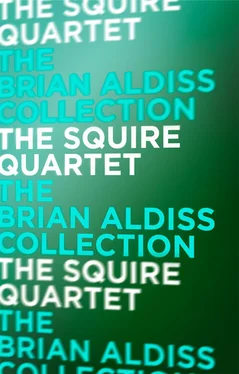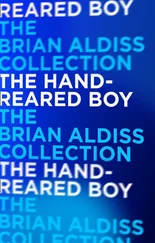He began to kiss her, pressing closer, forgetting himself, becoming just a warmth, sensing her delight. Her arms tightened as she sank back on the bed, their lips still together. Then her body began to heave under him, her leg hooked round his. Her tongue darted into his mouth, low gasps escaped her. He lay on top of her, eyes closed, ‘Drina’ burning his fingers. She ceased to move.
Rather than disturb her, he pinched out the cigarette stub with his fingers.
Gradually she stirred. She sighed. Judging his moment, he sat up, breathing so deeply he almost trembled. He took a small sip of the vodka. It was warm.
‘I must go, Tom, dear. I won’t stay.’ It was a faun’s glance she gave, there and away.
‘I’ll see you tomorrow.’
She stood up. Her mood had changed; she was gentle and not exactly downcast, although her eyes perpetually sought the floor.
‘Yes … Oh dear … It is tomorrow … That’s serious.’
He kissed her on the cheek, with care in case she did not wish it. She appeared not to notice. As she moved to the door, she said, ‘Perhaps we’ll have more time together.’
When she slipped into the dark corridor, she said, ‘Tom, the miraculous does sometimes happen.’
Squire stood listlessly at the door until she had disappeared, before moving back into the room. An envelope lay at his feet. As he stooped to pick it up, he thought that Selina must have dropped it, and instantly his mind conjured up a scene where he went to her bedroom to return it and found her undressing. But the note had his name on, written in a foreign hand; it had been slipped under the door. He immediately lost interest, and flipped it onto the table.
Locking the door, he went and lay on the bed, hands behind his head, his meditations possessed by Selina Ajdini.
In a moment of vision, succoured by the silence of the hour, he saw no mystery in personality. He perceived her with clarity, and the circumstances which surrounded her. The clarity neither magnified nor belittled her; it was cleansed even of compassion, for one condition of the vision was that his own personality, with all its limitations and potentials for growth, was also clear to him – a distortion in one would have implied a distortion in the other.
Within those linked visions burned his understanding of human nature, of its ramshackle structure, its transience, its quality of light.
There was nothing inscrutable about personality or relationships between people. These matters could be perceived, divined; in a sense he knew Selina fully. There was no puzzle. The puzzle came when such things had to be translated into words. Words belonged only to the cerebrum, the part of the brain that made man specifically human; but the mysterious world inhabited by whole understanding occupied all of the brain, and the nervous system beyond it, and the blood cells and body beyond that. It could not be reduced into words. Any system of understanding built purely on words – such as an ideology – was an impoverishment of the human being. Selina tried to live in her words, her ideology, because, for specific reasons, she was afraid of the whole world of her personality. Pain lurked there.
With patience and love, it would be possible to make that proscribed area accessible to her again. But not by words alone. Words alone could not defeat pain.
He climbed off the bed, assumed tadasana, and performed some steady hora breathing in order to clear his mind still further. Moments of meditation and vision could be encouraged, developed. They enlarged life. They created stillness.
The stillness was in some miraculous way eternal within the frames of a human life. Squire had experienced the first such perception at the age of four. He still recalled it: it had remained with him. The nursery with a coal fire burning, firelight reflecting on all the shining brown surfaces of the room. The child at the window, face half-turned to the outdoors, realizing the lure – the wilderness – of the world, as dusk filtered in. Realizing the unknown was limitless. It had been the first of his escapes beyond time, and in a way the most vivid. He had felt his own containedness and greatness. He had reached to an oceanic content within his own being.
There had been other similar moments before his father died; they continued after the watershed of that event.
The death had killed his tentative reaching towards the orthodoxies of the Christian religion, though not towards an unspoken mysticism. He saw only now that the unspokenness had preserved its freshness. He hated the very word ‘mysticism’; but of its flesh he was not in doubt, for he felt it inside him.
Even these reflections visited his mind without a cloud of words, as he slowed his breathing and set aside the hotel room.
With placid amusement, he detached himself from his body, rising above it to see a man, recently embraced by a woman, standing in still posture, mind clear of logical thought. That stillness, that balance, was a triumph, achieved within – the image always charged him with excitement – within the violent explosion that was the universe. He visualized the curdling galaxies, the stellar bodies, whirling away from each other, still fleeing from that primal explosion, that ejaculation of matter which began everything. The cosmos was still inexpressibly new.
All human experience was a brief dawn affair; more comprehensive experiences would be possible later in the cosmic day. Meanwhile, it was possible to develop towards greater understanding.
The sparks flew forever up the chimney. Turmoil was all that could be expected. There was evil in man, in men and women; only a fool would doubt it when he had the privilege of living in the twentieth century – as a being confined to a lunatic asylum would be the maddest of all inmates if he refused to believe in lunacy – but that evil was a flaw wrought by the holocaust of the physical world. That was where religion falsified the situation. Flames had no morality. If evil was a human creation, so was the concept of perfection. Wasn’t perfection always visualized as somehow static? And stasis was an impossibility in the exploding universe. It was a good idea to recognize the instability of all things, and to breathe deep and slow.
He threw off his clothes, brushed his teeth, and climbed between the sheets.
His mind would not let him sleep. He lay there for some while before realizing that sleep was not going to visit him yet. Some factor just beyond his grasp was worrying him.
He sat up with sudden impatience, saying into the wall of dark before his face, ‘But anyone who could speak so ill of Huxley cannot be a good person.’
Impatiently, he let his head thump back on the pillow.
Again, he tried to make himself sleep, concentrating on slow breathing. But the moment of rapture had curdled into a mood of self-distrust, sucking him back into the past with its regrets.
Images of disquiet flooded him. His father’s savage death. His mother’s dead countenance, patched with hitherto unknown browns and greys. The long estrangement from Teresa. Even the savagery with which the English critics, unlike those abroad, had attacked ‘Frankenstein Among the Arts’.
From serenity, he fell into despair.
Near at hand lay his doubts about the conference in Ermalpa, and his quarrel with d’Exiteuil. One of his beliefs was that, as the nineteenth century cultivated optimism, often of a rootless kind, so that century’s impoverished heirs and assigns of the twentieth cultivated a pessimism possibly as rootless. The art of enjoyment was lacking. He had always hoped to contribute to the general enjoyment; not as an entertainer – he had no gift for that – but as an appreciater, one who could enhance other people’s lives, as his father had enhanced his. That had been the driving force behind his great television series and the book related to it.
Читать дальше












